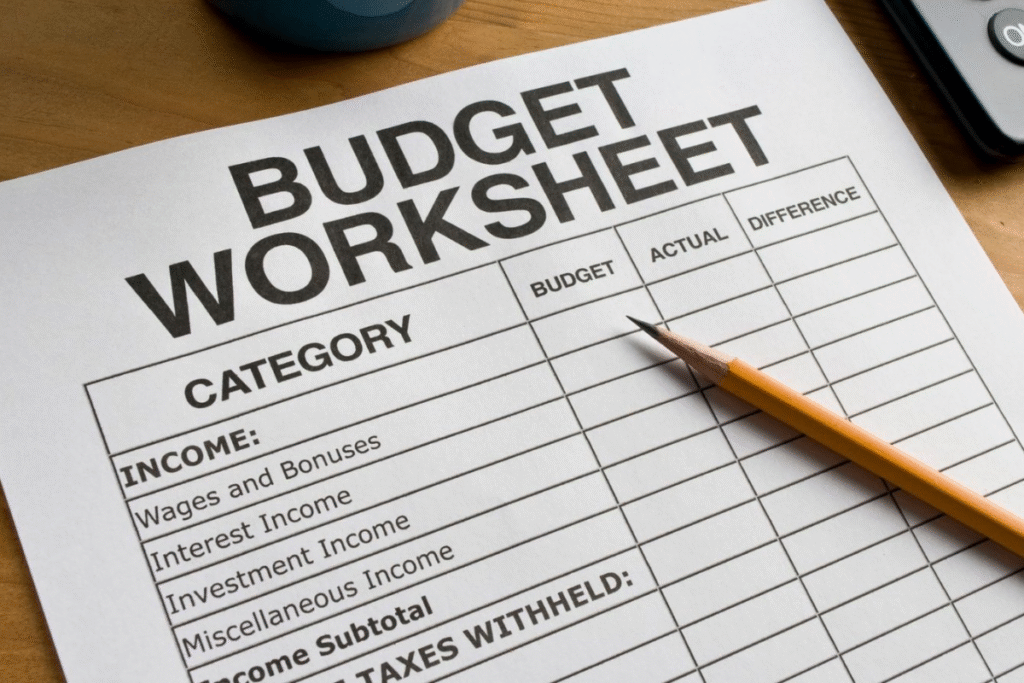Understanding the Importance of Budgeting
Budgeting is an essential practice for achieving financial health and stability. At its core, budgeting involves the careful allocation of income to various expenses, ensuring that individuals live within their means.
Benefits of a budget
- Track your spending– One of the primary benefits of establishing a budget is the ability to track expenditures effectively. By categorizing expenses, individuals can gain insights into their spending habits, identify unnecessary expenditures, and make informed decisions about where to cut costs. This level of awareness is fundamental for maintaining financial control.
- Helps prevent debt accumulation – Moreover, budgeting plays a pivotal role in avoiding debt accumulation. A significant number of individuals face financial difficulties due to unmonitored spending, which leads to reliance on credit and, ultimately, increased debt. According to recent studies, nearly 80% of Americans live paycheck to paycheck, often resulting in credit card debt as they resort to borrowing to cover unexpected expenses. A well-structured budget can act as a safeguard, promoting responsible financial behavior that diminishes the likelihood of falling into a debt trap.
- Helps you save more– In addition to curbing debt, budgeting is crucial for saving toward future goals and aspirations. Whether it is building an emergency fund, saving for a down payment on a home, or planning for retirement, having a budget allows individuals to set aside money specifically for these objectives, research shows that individuals who maintain a budget are more likely to save successfully; in fact, they can save up to 30% more than those who do not budget. This capacity to plan for the future not only provides peace of mind but also fosters a sense of financial security. Learn more about saving tips here.
In conclusion, the importance of budgeting cannot be overstated. It serves as a foundational tool for tracking spending, preventing debt, and facilitating savings. Establishing a budget early on is a wise strategy that empowers individuals to take charge of their financial futures.
Now, let’s look at the steps we can take to create a reasonable budget plan:
Table of Contents
1. Identifying Your Financial Goals

Establishing clear financial goals is a crucial step in creating a successful monthly budget. These goals provide direction and purpose to your budgeting efforts, helping you prioritize your financial decisions effectively.
There are generally two categories of financial goals: short-term and long-term.
- Short-term– Short-term goals might include saving for a vacation, purchasing a new appliance, or paying off a specific debt. These objectives are typically achievable within a year.
- Long-term– Long-term goals focus on larger aspirations, such as saving for retirement, purchasing a home, or funding your children’s education, which may take several years to realize.
To begin, reflect on what you truly want to achieve financially. Start by listing potential goals without filtering them. After compiling your list, categorize them into short-term and long-term. This exercise will provide clarity on your priorities and the steps necessary to achieve each goal.
Once you have defined your goals, it is essential to prioritize them. Not all financial goals can be pursued simultaneously due to budget constraints. Consider using the SMART criteria—specific, measurable, achievable, relevant, and time-bound—to evaluate each goal. For example, instead of a vague goal such as “save money,” specify “save $2,000 for a vacation within 12 months.” This approach not only makes your goals more attainable but also helps you track progress.
Moreover, regularly reassessing your goals is vital as life circumstances can change. Financial goals should be adaptable to reflect your shifting priorities and ensure they remain in alignment with your overall financial health. By carefully identifying and prioritizing your financial goals, you will lay a solid foundation for your monthly budgeting strategy, further enhancing your financial literacy and stability.
2. Gathering Financial Information

Creating a precise monthly budget requires a meticulous approach to gathering financial information.
Steps you can follow
- Identify your sources of income – The first step in this process is to identify all sources of revenue, which may include your salary, bonuses, side hustles, retirement benefits, or any other earnings. Being thorough in this step is crucial, as even minor income sources can contribute significantly to your financial stability. Documenting this information not only helps establish your financial baseline but also aids in forecasting potential changes and fluctuations in your income.
- Analyze your expenses– Once your income sources are identified, the next critical aspect is analyzing your expenses. Expenses can be broadly categorized into fixed and variable expenses. Fixed expenses are those that remain constant each month, such as rent or mortgage payments, insurance premiums, and monthly subscriptions. In contrast, variable expenses may fluctuate, encompassing items such as groceries, entertainment, and transportation costs. Listing both types of expenses accurately will form the foundation of your budget, ensuring that you have a comprehensive view of your financial commitments.
- Include any irregular expenses – In addition to fixed and variable costs, it is essential to account for any irregular expenses that may arise throughout the year. These could include annual fees, car maintenance, or unexpected medical bills. Being mindful of these expenses allows you to plan, setting aside funds specifically for these occurrences to prevent potential financial strain. Thoroughness in gathering all relevant financial information will provide you with clarity, enabling you to make informed decisions and avoid any unpleasant surprises in the future.
By systematically gathering and organizing this financial data, you will be well-equipped to create a balanced and realistic budget that accommodates your financial objectives while allowing for necessary expenditures.
3. Choosing a Budgeting Method

When creating a monthly budget, selecting the correct budgeting method is crucial for effectively managing personal finances. There are several popular budgeting methods, each with distinct advantages and potential drawbacks. Understanding these methods empowers individuals to choose the approach that best aligns with their unique financial circumstances and lifestyle.
- The 50/30/20 rule– One commonly used approach is the 50/30/20 rule. This method divides the monthly income into three main categories: 50% for necessities, such as housing and groceries; 30% for discretionary spending on things like entertainment and dining out; and 20% for savings and debt repayment. The simplicity of the 50/30/20 rule is its main advantage, making it a suitable choice for beginners. However, it may lack flexibility for those with varying expenses or financial goals, such as high student loan payments.
- The zero-based budgeting – Another effective budgeting technique is zero-based budgeting. This method requires allocating every dollar of income towards expenses, savings, or debt repayment, resulting in a balance of zero at the end of the month. Zero-based budgeting encourages active engagement with one’s finances, allowing for a detailed understanding of spending habits. However, this approach can be time-consuming and may feel overwhelming to beginners due to its meticulous nature.
- The Envelope System – Lastly, the envelope system provides a tangible way to manage money. In this method, individuals allocate cash into physical envelopes designated for specific spending categories. When the cash in an envelope is depleted, no more spending occurs in that category for the month. This system can be particularly beneficial for those who struggle with overspending. However, it may be less practical in an increasingly cashless society, making digital management a challenge.
Overall, selecting the best budgeting method hinges on personal preferences, financial goals, and spending habits. By considering the advantages and disadvantages of each approach, individuals can determine which budgeting method aligns most closely with their financial journey.
4. Creating Your Budget Worksheet

Establishing a budget worksheet is a fundamental step for anyone aiming to manage their finances effectively. A budget worksheet serves as a structured format to help track income and expenses, ultimately allowing you to gain a clearer picture of your financial situation. To create an effective worksheet, start by defining the categories that will encompass your income, expenses, and savings.
The steps to follow
- Income section – Your income section should include all sources such as salaries, freelance payments, rental income, and any other earnings. It’s crucial to list these accurately to ensure your budget reflects your total monthly income.
- Expenses section – Following this, outline your expenses, which can be divided into fixed and variable categories. Fixed costs might include rent, utilities, and insurance, while variable expenses can encompass groceries, dining out, and entertainment.
- Savings section – Another essential category is savings; allocating a portion of your income for future goals or emergencies is vital for financial stability.
Utilize budgeting tools or templates effectively.
To simplify the budgeting process, consider using budgeting tools or templates. Numerous digital resources exist, including dedicated budgeting apps and spreadsheets designed for ease of use. Popular apps, such as Mint or You Need a Budget (YNAB), automate calculations and provide visual representations of your spending habits. Alternatively, you can opt for a paper-based approach if you prefer maintaining a physical record. Numerous printable templates are available online, allowing customization to suit individual preferences. Whichever method you choose, the critical aspect is to remain consistent in updating the worksheet; regular reviews will enhance your budgeting skills and help you stay on track.
Ultimately, creating a budget worksheet can provide significant insights into your financial habits and aid in achieving your monetary goals. By organizing your finances visually, you can make informed decisions towards a healthier financial future.
5. Tracking Your Spending

Effectively managing a budget requires a commitment to actively tracking your spending. This essential step not only helps ensure you adhere to your financial plan but also provides valuable insights into your spending habits. By maintaining a detailed record of your expenditures, you can identify patterns, make informed decisions, and adjust your budget as necessary.
Methods to track your expenses
There are several methods available for tracking expenses, catering to different preferences.
- Use mobile apps – One of the most convenient methods is using mobile apps designed to simplify the budgeting process. Numerous applications allow you to categorize your expenses and integrate them with your bank accounts for real-time updates, making tracking effortless. Some popular options include Mint, YNAB (You Need a Budget), and PocketGuard. These tools often include features such as spending alerts, financial goal-setting, and statistical analysis, enhancing your understanding of spending behavior.
- Create a spreadsheet – If you prefer a more hands-on approach, creating a spreadsheet can be an effective way to organize your financial information. Spreadsheets offer the flexibility to design a personalized tracking system, allowing you to categorize expenses and visualize your financial data. Tools like Microsoft Excel or Google Sheets enable calculations, graphs, and templates, allowing you to tailor the budget to your specific needs.
- The pen-and-paper method – For those who cherish the traditional route, utilizing a pen-and-paper method can be equally effective. Keeping a physical ledger or journal to record daily expenses encourages mindfulness about spending and offers a tangible representation of your financial journey. This method may appeal to individuals who appreciate a slower, more intentional approach to budgeting.
Regardless of the method you choose, it is crucial to conduct regular check-ins to assess your progress. Weekly or monthly reviews of your spending against your budget help establish accountability, highlight areas for improvement, and allow for necessary adjustments. By adapting your tracking system to your lifestyle and committing to consistent reviews, you will cultivate better spending habits, ensuring your budget remains a reliable tool in achieving your financial goals.
6. Adjusting Your Budget as Necessary

Creating a budget is often considered a foundational step toward achieving personal financial stability. However, it is essential to recognize that a budget is not a static tool; it requires ongoing adjustments to reflect changes in income, expenses, or financial goals. As individuals navigate various life phases, the ability to review and adjust a budget becomes crucial for maintaining financial health.
Reasons to adjust your budget
- Fluctuating income– One of the key reasons for adjusting a budget is fluctuating income. For instance, if someone experiences a change in employment status, such as losing a job or obtaining a promotion, their income will vary. This shift necessitates a re-evaluation of existing budget allocations. By tracking income sources diligently, individuals can adjust their financial plans accordingly, ensuring they stay on a path toward achieving their financial objectives.
- Changes in expenses also warrant a review of one’s budget. Life is characterized by unexpected events—ranging from medical emergencies to car repairs—that can significantly impact spending. Therefore, maintaining a contingency plan within the budget is beneficial. By setting aside a portion for unforeseen expenses, individuals can minimize the stress associated with sudden financial burdens. Additionally, periodically examining fixed costs, such as subscriptions or utilities, can provide opportunities for cost-saving adjustments.
- Evolving financial goals – Finally, evolving financial goals should prompt a reassessment of the budget. Life milestones, such as marriage, home buying, or retirement, often lead to new financial priorities. By regularly discussing and documenting goals, individuals can align their budgets with their aspirations, leading to potential investment opportunities or savings milestones.
Flexibility in adjusting budget plans allows individuals to respond to life’s unpredictability, thus fostering a healthier financial mindset.
7. Overcoming Common Budgeting Challenges

Creating a monthly budget is a crucial step toward achieving financial stability; however, beginners often encounter various challenges that can hinder their progress.
- Maintaining motivation– One of the most prevalent obstacles is maintaining motivation throughout the budgeting process. It is essential to set realistic financial goals that align with personal values and aspirations, which can help sustain motivation over time. Beginners should consider establishing a reward system; for instance, treating oneself with a small purchase after reaching a budgeting milestone can reinforce positive budgeting behavior.
- Impulse spending– Another common pitfall is impulse spending, which can significantly derail a carefully crafted budget. To tackle this issue, individuals should identify triggers that lead to impulsive purchases, whether it be stress, social pressure, or advertising. Developing a strategy for managing these triggers is crucial. Practicing the “24-hour rule” is effective; it involves waiting a full day before making non-essential purchases. During this time, one can assess whether the item is necessary and determine its place within the overall budget.
- Unexpected expenses – Unexpected expenses also present a considerable challenge for many beginners. Life is unpredictable, and unforeseen costs, such as medical bills, car repairs, or home maintenance, can arise at any time. To prepare for these unanticipated costs, it is advisable to establish an emergency fund as part of the budgeting plan. Allocating a portion of each month’s income to this fund can provide a financial buffer, allowing individuals to navigate unforeseen expenses without derailing their entire budget.
In summary, addressing common budgeting challenges—such as motivation, impulse spending, and unexpected expenses—is essential for beginners seeking long-term financial success. By employing strategies tailored to these challenges, individuals can significantly enhance their budgeting experience and achieve their financial goals.
8. Celebrating Success and Long-term Financial Health

Establishing a monthly budget is a significant milestone as it marks the beginning of a journey toward financial awareness and accountability. As you engage in this process, it is essential to celebrate even the most minor victories along the way. Recognizing these achievements can motivate you to continue adhering to your budget and maintaining good financial habits. Whether it is successfully saving a certain percentage of your income, reducing unnecessary expenditures, or paying off a debt, each of these accomplishments signifies progress toward your overarching financial goals.
Achieving long-term financial security
The practice of working within a budget can often feel restrictive; however, it offers an invaluable framework for achieving long-term financial security. By sticking to a monthly budget, you develop a clearer understanding of your income and expenses, enabling you to make informed decisions about where your money goes. This knowledge empowers you to allocate funds more effectively, focusing on needs rather than wants and prioritizing financial stability.
Having a sense of peace and confidence
Moreover, sustainable financial practices foster a sense of peace and confidence in your financial situation. Consistently adhering to your budget can help build a safety net for unforeseen circumstances, such as medical emergencies or unexpected job loss. Having savings set aside not only alleviates stress but also allows for responsive actions in critical situations. Additionally, budgeting promotes disciplined spending habits, ensuring that you live within your means while still making progress toward larger financial objectives, such as retirement or purchasing a home.
In conclusion, celebrating your financial successes and recognizing progress can significantly enhance your budgeting journey. A diligent commitment to budgeting not only contributes to immediate financial stability but also supports long-term health and well-being. Cultivating these habits can ultimately lead to a secure and prosperous financial future.

